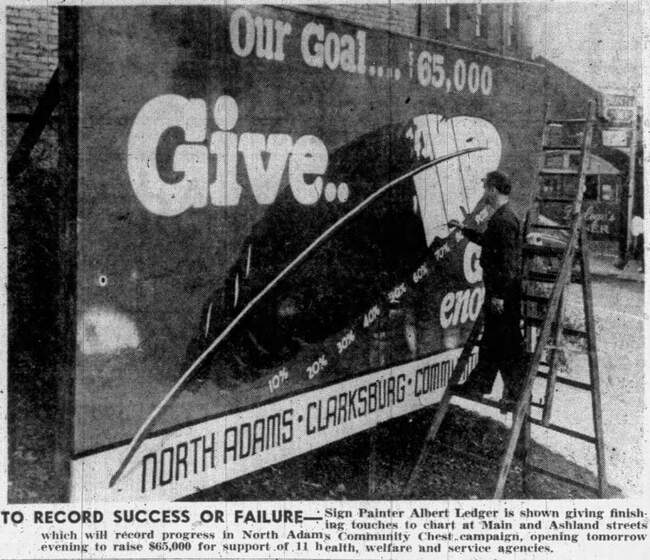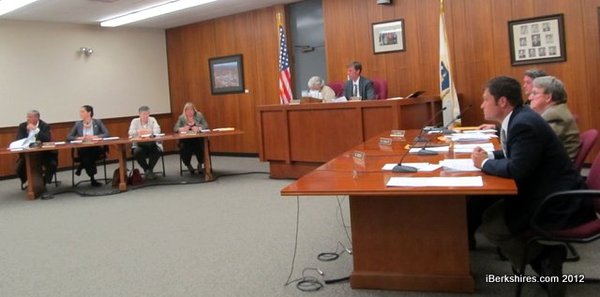
North Adams Council OKs Demo Review, Comp Plan
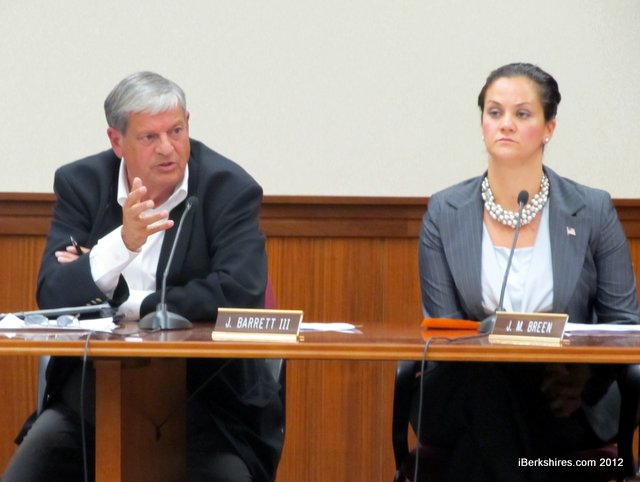 Councilors John Barrett III and Jennifer Breen had different objections to a proposed historic preservation ordinance passed on Tuesday. |
The compensation and classification plan was approved at second reading 8-1, with Councilor John Barrett III voting against.
Barrett pointed to what he said were discrepancies in the compensation plan as compared to the budget and that he thought the Finance Committee would review the plan after he had raised those same concerns at the last meeting.
He specifically pointed to increases in salaries for the skating rink manager, the auditor and the assistant information services manager.
"A year ago, we heard this city was going down the tubes and we're giving a $10K salary increase," he said of the rink manager, pressing the members of the Finance Committee on what the salary was. "I don't believe this compensation plan has been vetted and I don't think we should vote on that tonight."
Finance Committee Chairman Alan Marden said the committee was aware of the changes and had discussed them at length with the mayor during the budget hearings.
"Every salary was reviewed by the Finance Committee," said Marden, who added the committee had also had a draft of the compensation plan. "We reviewed it, we approved it. The comment [from the mayor] was that it was necessary to keep that employee."
"To say it was not vetted properly is a little insulting," said committee member David Bond, noting that six meetings were held. "Anybody could have come to the meetings and asked questions."
Barrett, however, insisted there was no consistency in the raises and that some positions were getting more while "our nonunion employees are getting peanuts."
Mayor Richard Alcombright said all salaries had been reviewed by the committee and the compensation plan didn't always match the budget because he had "padded it" in anticipation of raises in the coming year. Some raises, particularly the ones pointed out by Barrett, had been made for retention and equity reasons, said the mayor.
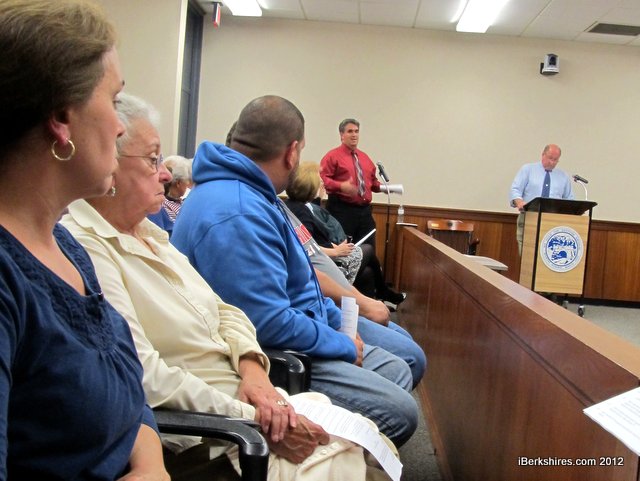 Administrative Officer Michael Canales explains a utility aggregation plan in which the city would bid for electricity. If the rates are low enough, it would lock in for three years for residents and businesses, who could opt out of the plan. |
The ordinance giving authority to the Historical Commission to delay demolition of historic building 50 years or older passed 6-2, with Marden, who works in real estate, abstaining because of possible conflict of interest.
Both Barrett and Council Jennifer Breen voted against the ordinance.
Barrett said he was not opposed to the goal of the ordinance but thought enough regulations were already in place — such as site review and planning — to keep any landmark buildings safe. Public pressure would also be a strong deterrent, he said, although he would support sending it back to the committee for more review.
Breen, a member of the General Government Committee who voted to recommend the ordinance on Monday night, returned to her original objections that it could impede private development. She first, however objected to the committee's amendment of the ordinance to change the references to "building commissioner" to "building inspector."
Breen thought the change was a possible violation of Open Meeting law because amending was not listed on the agenda. She suggested it be referred back to the committee. Committee Chairman Keith Bona said he couldn't understand why that should be done since the committee would simply be approving something it had already approved.
City Solicitor John DeRosa several times gave his opinion that there was no violation of Open Meeting. Breen voted for the amendment but then balked at voting on the ordinance, returning to her concern that the measure was designed to prevent the demolition of St. Francis' Church — and possibly stop a project that would add to the tax base.
"I can't support an ordinance that I don't have full transparency," she said, adding she had received phone calls from some elderly residents more concerned with property taxes than historic buildings. "What if it's someone who could reduce the property tax base. ... I just don't think the due diligence was done."
The city solicitor's involvement, she said, was a clear conflict of interest because of his standing as a principal of the not-for-profit Partnership for North Adams, an economic development group.
DeRosa, solicitor for 20 years, said the partnership does not buy or own property and that his relation to the ordinance was to recommend that it was legally correct. It was up to the council to determine if it was the correct policy for the city, he said.
"I certainly do not find myself conflicted to have drafted the ordinance," he said.
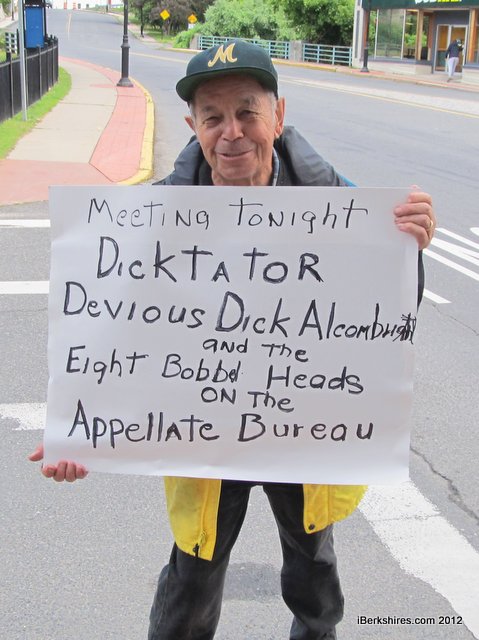 Robert Cardimino, banned from City Hall, still managed to get his message out Tuesday by holding a sign on the sidewalk. |
Committee Chairman Keith Bona and Councilor Nancy Bullett both spoke in favor of the ordinance. "It's a protective mechanism rather than taking the steam roller down on something we may regret later," said Bullett.
"This is doing exactly what we want it to do ... it brings it to the public," said Bona, since the Historical Commission would have to hold public hearings on any demolition request. The biggest regret from residents has been about the razing of the downtown 40 and 50 years ago, he said. The ordinance might not stop demolition, but he said, we can tell our children, "we know you don't like that gas station there but we tried our best to stop it."
Breen continued raising the issues of taxes, saying she wanted to decrease them, when the council went to vote on giving the city clerk a stipend of $1,200 for her council duties. The order had been submitted by the council, but Breen turned on the mayor, bringing up last year's Proposition 2 1/2 vote.
"I'm sick of the city raising taxes," said Breen, demanding to know what happened to the "doomsday" scenario. "The override didn't happen but we're still giving raises."
Alcombright said the budget was still $600,000 in the red and that the raises were a minor percentage of that. Obviously annoyed, he said he found it odd that Breen was raising the issue now after having voted for the budget and the compensation plan.
The stipend for city clerk passed 8-1, with Breen voting no.
In other business, the council:
• Approved the creation of a revolving account with $30,000 in free cash to take over the sales of aviation fuel at the airport from former operator Shamrock Aviation. All equipment is already owned by the city; councilors made clear they would like the $30,000 returned to free cash when the operation makes a profit.
• Approved other free cash transfers of $450,000 to stabilization and about $49,000 for leasing of three cruisers and fire director's vehicle.
• Approved a plan for an electrical aggregation cooperative. The city would bid for a three-year price; citizens and companies would be able to opt out of the program. Average savings would be $5-$8 a month, which could increase if rates go up.
• Set public hearings on July 10 for National Grid's request to move a pole and on July 24 to declare an Eagle Street structure a public nuisance for demolition.
Tags: city council, compensation & classification, ordinances,




